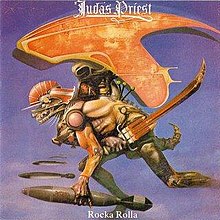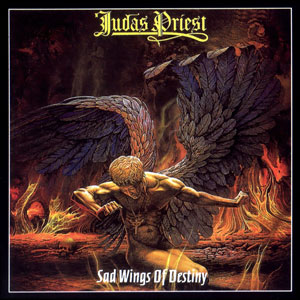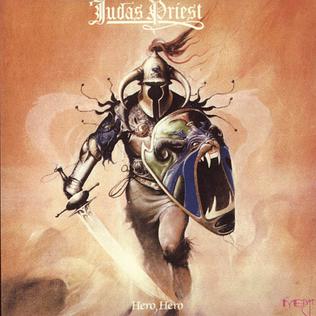One album per week or longer if need be, 16 studio albums (maybe 17 if one gets released next year), 8 live albums/videos.
------------------------------------------------

Rocka Rolla (1974)

2000 Reissue artwork
Rob Halford - Lead vocals and harmonica
K.K. Downing - Guitar
Glenn Tipton - Guitar and Synth
Ian Hill - Bass
John Hinch - Drums
---------------------------------------------
In 1974, anything was possible with music. Progressive Rock was reaching its peak, with Genesis, Yes, and King Crimson all releasing seminal albums and a young Rush emerging with Working Man. Stadium Rock giants such as Queen and Kiss were beginning to hit their stride and Heavy Metal continued to grow with Deep Purple beginning a new era with David Coverdale and Black Sabbath still going strong with Ozzy Osbourne. It was the perfect time for a new sound and it came in the form of Judas Priest.
Judas Priest had the Metal edge of Sabbath, the Blues tinge of Led Zeppelin, and even the Progressive qualities of bands like King Crimson. While not the band that they would become just a few years later, Judas Priest was something different and their power could already be heard on the first album.
The band began life in 1970 with childhood friends K.K. Downing and Ian Hill in Birmingham. The band named themselves after a disbanded group led by original vocalist, Al Atkins. This lineup wrote music and played several gigs (with several different drummers) in Birmingham area before the departure of Atkins in 1973. It was then that the band found Rob Halford and drummer John Hinch from another band called Hiroshima. The Rocka Rolla lineup was almost complete and as the band got ready to hit the studio, Glenn Tipton was hired as a second lead guitarist.

Judas Priest with original singer, Al Atkins
From the very start, Judas Priest had a dark and heavy sound with an almost industrial edge inspired by the steel mills that surrounded the band members during their childhoods. While these features would become more prominent later on, you can hear this sound developing on the very first album. Also found on the first album are the signature twin guitar attacks and soaring vocals of Rob Halford. The album was produced by Rodger Bain, who also produced the early Sabbath albums.
Part of the power of the debut can be credited to the band performing it "live". In other words, what you hear is the entire band playing through the song, rather than the more traditional method of recording bits and pieces and mixing it together.
Although Halford had a large influence on the songwriting, many of the songs were written while Atkins was in the band and he receives credit on three songs, Winter, Never Satisfied, and Caviar and Meths. Despite only being in the band for a short time at that point, Tipton also receives credit on Rocka Rolla and Run of the Mill.
Unfortunately, Rocka Rolla was not created exactly the way the band intended. The label had large control over the album and songs intended for the album, such as Victim of Changes and Tyrant were left off. There were also production errors that compromised the sound. The artwork remains a bit of a mystery and has since been replaced by new (and more fitting) artwork by Melvyn Grant, who also designed many of Iron Maiden's albums, including Fear of the Dark and The Final Frontier.

The new Rocka Rolla artwork was adapted from sci-fi novel, The Steel Tsar
While most people think leather jackets and studs when it comes to Judas Priest's image, they didn't always look this way. In the beginning, Priest was very much a product of the 70's. Flamboyant outfits, long hair, and a general "hippie" vibe characterized Judas Priest during this time period.

Like many debut albums, Rocka Rolla has largely been forgotten by both fans and the band. Despite having many characteristics of Priest's original sound, it is still quite different and is far from showing their full potential. The band quickly abandoned these songs in the live setting until 2011 when Never Satisfied was brought back for the Epitaph tour.
------------------------------------------------

Rocka Rolla (1974)

2000 Reissue artwork
Rob Halford - Lead vocals and harmonica
K.K. Downing - Guitar
Glenn Tipton - Guitar and Synth
Ian Hill - Bass
John Hinch - Drums
---------------------------------------------
In 1974, anything was possible with music. Progressive Rock was reaching its peak, with Genesis, Yes, and King Crimson all releasing seminal albums and a young Rush emerging with Working Man. Stadium Rock giants such as Queen and Kiss were beginning to hit their stride and Heavy Metal continued to grow with Deep Purple beginning a new era with David Coverdale and Black Sabbath still going strong with Ozzy Osbourne. It was the perfect time for a new sound and it came in the form of Judas Priest.
Judas Priest had the Metal edge of Sabbath, the Blues tinge of Led Zeppelin, and even the Progressive qualities of bands like King Crimson. While not the band that they would become just a few years later, Judas Priest was something different and their power could already be heard on the first album.
The band began life in 1970 with childhood friends K.K. Downing and Ian Hill in Birmingham. The band named themselves after a disbanded group led by original vocalist, Al Atkins. This lineup wrote music and played several gigs (with several different drummers) in Birmingham area before the departure of Atkins in 1973. It was then that the band found Rob Halford and drummer John Hinch from another band called Hiroshima. The Rocka Rolla lineup was almost complete and as the band got ready to hit the studio, Glenn Tipton was hired as a second lead guitarist.

Judas Priest with original singer, Al Atkins
From the very start, Judas Priest had a dark and heavy sound with an almost industrial edge inspired by the steel mills that surrounded the band members during their childhoods. While these features would become more prominent later on, you can hear this sound developing on the very first album. Also found on the first album are the signature twin guitar attacks and soaring vocals of Rob Halford. The album was produced by Rodger Bain, who also produced the early Sabbath albums.
Part of the power of the debut can be credited to the band performing it "live". In other words, what you hear is the entire band playing through the song, rather than the more traditional method of recording bits and pieces and mixing it together.
Although Halford had a large influence on the songwriting, many of the songs were written while Atkins was in the band and he receives credit on three songs, Winter, Never Satisfied, and Caviar and Meths. Despite only being in the band for a short time at that point, Tipton also receives credit on Rocka Rolla and Run of the Mill.
Unfortunately, Rocka Rolla was not created exactly the way the band intended. The label had large control over the album and songs intended for the album, such as Victim of Changes and Tyrant were left off. There were also production errors that compromised the sound. The artwork remains a bit of a mystery and has since been replaced by new (and more fitting) artwork by Melvyn Grant, who also designed many of Iron Maiden's albums, including Fear of the Dark and The Final Frontier.

The new Rocka Rolla artwork was adapted from sci-fi novel, The Steel Tsar
While most people think leather jackets and studs when it comes to Judas Priest's image, they didn't always look this way. In the beginning, Priest was very much a product of the 70's. Flamboyant outfits, long hair, and a general "hippie" vibe characterized Judas Priest during this time period.

Like many debut albums, Rocka Rolla has largely been forgotten by both fans and the band. Despite having many characteristics of Priest's original sound, it is still quite different and is far from showing their full potential. The band quickly abandoned these songs in the live setting until 2011 when Never Satisfied was brought back for the Epitaph tour.
Last edited:

 . As you mentioned, they did look a lot different. Rob with long hair, Tipton with wide jeans, KK with a hat etc. Very nice to see their early years and think how much bigger and more Metal they grew. The guitars sounded so weak back then
. As you mentioned, they did look a lot different. Rob with long hair, Tipton with wide jeans, KK with a hat etc. Very nice to see their early years and think how much bigger and more Metal they grew. The guitars sounded so weak back then  .
.




